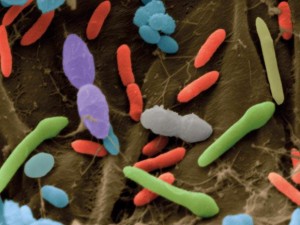The recent news of gut bacteria possibly being involved in causing heart attacks (see details below) sounds pretty outrageous. In order to make this more understandable, we need to start backtracking how bacteria end up in our gut and what they are doing there.
Gut bacteria in our bowels at various stages in life
Even among infants there is a huge difference in the composition of the gut flora depending on whether the baby was vaginally delivered, born by Cesarean section or prematurely born and nursed in an intensive care unit for a prolonged period of time.
When we are grown up, it depends on where we live on our planet as to what type of gut flora we have. A 2011 study of the bacterial composition of stool samples in Europe versus Africa showed that the European microbiome in the colon was typical of the Bacteroides enterotype, whereas the African microbiome was dominated by the Prevotella enterotype. Other studies have shown that the type of diet we eat causes us to harbor different types of gut flora. A person eating a more vegetarian diet will have a Prevotella enterotype gut flora, while another person eating a Western style fat and protein dominated diet will have a Bacteroides enterotype gut flora. What is the gut flora doing? It lives within our gut for our mutual benefit. We provide the gut bacteria a comfortable home at body temperature where they grow best. They in turn ferment undigested foods, protect us from the growth of harmful bacteria, produce vitamins like vitamin K and biotin, and produce hormones that direct the body to store excess food as fat.
Cleveland Clinic’s gut flora research linked to heart attacks
In April 2013 reports that heart attacks may be related to the composition of your gut flora hit the popular press, articles like this. Two years earlier, in April of 2011, the same Cleveland research group under Dr. Stanley Hazen found that the gut flora composition has an impact on heart disease. They stated that a “byproduct called trimethylamine N-oxide (TMAO) is produced when intestinal bacteria digest the nutrient phosphatidylcholine, commonly known as lecithin”. It was determined that the liver was responsible for producing TMAO out of absorbed materials from gut bacteria and that this was responsible for accelerating hardening of the arteries, which in turn caused deadly heart attacks and strokes.
As can be seen from this link the Cleveland research group is suggesting that TMAO could become a valuable screening tool when measured in patients’ blood to screen for their risk to develop a heart attack or stroke in the future. Furthermore, once these patients are identified, they can be sent to a dietitian and be put on a different diet that prevents heart attacks and strokes; also, the progress could again be monitored through repeat TMAO blood tests down the road.
Criticism of research from the Cleveland Clinic
Not every one has welcomed the study as clear-cut proof for a link between the gut flora and heart attacks, strokes and deaths. This link shows that it is questioned whether perhaps low antibiotic residues in red meat would explain the findings of the study. It rightly points out that there was no control for whether the more than 4000 patients were eating organic foods or a regular American diet. The comment goes on to say that the regular American diet contains residual antibiotics from milk, milk products, beef, chicken and turkey. These traces of antibiotics are powerful enough to have an effect on the gut flora, which likely is the reason for the differences between the vegetarian diet versus a Western style fat and protein dominated diet. It is entirely possible that grass fed beef would not lead to TMAO levels in the blood whereas regular beef or hamburger meat will raise the TMAO levels. The same could be true for egg consumption, which was also accused of raising TMAO levels. However, we do not know whether organic eggs that do not contain antibiotics would have done the same as regular eggs that contain traces of antibiotics.
Cancer caused by gut flora
This 2008 review article explains how lactobacillus and bifidobacteria (probiotics) prevent colon cancer, while bacteria of the Bacteroides and Clostridium variety increase the incidence of colon cancer and the growth rate of colonic tumors. So, the composition of your gut flora does not only matter with regard to prevention of heart attacks and strokes, but is also important in preventing colon cancer.
Change your gut flora to boost your health
Here is where the “rubber hits the road”. What I mean is that you can benefit from all of this research with regard to your health by paying attention to a few facts and possibly making a few changes as follows.
- I think that the argument of the bulletproofexec.com website holds true and we should all eat organic meats whenever possible. The Cleveland study has already shown that the gut flora in vegetarians stayed healthy even when they occasionally slipped and ate a regular steak.
- Take supplemental probiotics from the health food store. It will improve your gut flora within a day or two.
- Higher intake of fruit and vegetables make a measurable difference in the body decreasing the risk for heart attacks and strokes as this British research group has shown. Another research group from Italy has confirmed that an increased intake of fruit and vegetables mobilizes genetic switches that will stabilize the metabolism of the gut wall and prevent cancer of the colon.
So, the verdict for boosting your health is out: eat organic foods, use probiotics as supplements and eat more fruit and vegetables!
More information on nutrition: http://nethealthbook.com/health-nutrition-and-fitness/nutrition/
References
- http://www.nature.com/nm/journal/v19/n5/full/nm.3145.html
- http://www.ncbi.nlm.nih.gov/pubmed/23614584
Last edited Nov. 7, 2014






